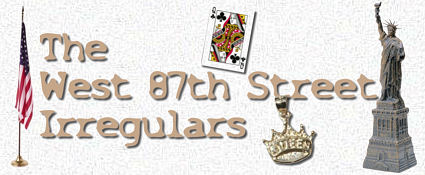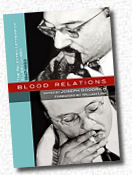


![]()
|
Joseph Goodrich  Dit lid van de
West 87th Street
Irregulars is iemand die Ellery
Queen fans alsook diegene die alle
hoeken en kanten van deze website hebben
doorsnuffeld. Joe is reeds lang een
Ellery Queen fan, die onze
favoriete schrijver en detective ontdekte
tijdens zijn kindertijd. Enige jaren
geleden, vlak na het Ellery Queen
Centenial symposium in New York City,
bezorgde Joe ons reeds
een
essay waarin hij getuigde van zijn
vroege en levenslange affectie voor de
werken van Ellery Queen.
Als nieuw lid van de West 87th Street
Irregulars voorzag Joe ook in een nieuwe
essay, hieronder terug te vinden, hierin
adresseert hij het onderwerp aangesneden in
zijn recente boek Blood Relations – met de
briefwisseling tussen Frederic Dannay and
Manfred B. Lee welke een beeld geven van hun
creatieve gevechten die integraal deel
uitmaakten van het schepping van de
Ellery Queen mysteries. Dit lid van de
West 87th Street
Irregulars is iemand die Ellery
Queen fans alsook diegene die alle
hoeken en kanten van deze website hebben
doorsnuffeld. Joe is reeds lang een
Ellery Queen fan, die onze
favoriete schrijver en detective ontdekte
tijdens zijn kindertijd. Enige jaren
geleden, vlak na het Ellery Queen
Centenial symposium in New York City,
bezorgde Joe ons reeds
een
essay waarin hij getuigde van zijn
vroege en levenslange affectie voor de
werken van Ellery Queen.
Als nieuw lid van de West 87th Street
Irregulars voorzag Joe ook in een nieuwe
essay, hieronder terug te vinden, hierin
adresseert hij het onderwerp aangesneden in
zijn recente boek Blood Relations – met de
briefwisseling tussen Frederic Dannay and
Manfred B. Lee welke een beeld geven van hun
creatieve gevechten die integraal deel
uitmaakten van het schepping van de
Ellery Queen mysteries.Joe Goodrich is zowel auteur als dramaturg wiens stukken zowat in gans de Verenigde Staten zijn opgevoerd en werden gepubliceerd bij Samuel French, Playscripts, the Padua Hills Press en Applause Books, .... "Panic" ontving zelfs de 2008 Edgar Award for Best Play. Hij is ook de samensteller van Blood Relations: The Selected Letters of Ellery Queen,  1947-1950
(Perfect
Crime Books, 2012). Zijn kortverhaal “Dear
Mr. Queen” werd opgenomen in de MWA
bloemlezing The Mystery Box, samengesteld
door Brad Meltzer, welke wordt uitgegeven in
de lente van 2013. “Murder in the Sixth”
verscheen dan weer in The Rich and the Dead,
de 2011 MWA bloemlezing samengesteld door
Nelson DeMille. Zijn non-fictie werken
verschenen bij Mystery Scene and Crimespree.
Hij is tevens een afgestudeerd van de school
van New Dramatists, en een voormalig
Calderwood Fellow aan de MacDowell Colonie.
Hij woont in New York City! 1947-1950
(Perfect
Crime Books, 2012). Zijn kortverhaal “Dear
Mr. Queen” werd opgenomen in de MWA
bloemlezing The Mystery Box, samengesteld
door Brad Meltzer, welke wordt uitgegeven in
de lente van 2013. “Murder in the Sixth”
verscheen dan weer in The Rich and the Dead,
de 2011 MWA bloemlezing samengesteld door
Nelson DeMille. Zijn non-fictie werken
verschenen bij Mystery Scene and Crimespree.
Hij is tevens een afgestudeerd van de school
van New Dramatists, en een voormalig
Calderwood Fellow aan de MacDowell Colonie.
Hij woont in New York City!
Kurt Sercu |


|
A KIND OF TRIUMPH William Butler Yeats once observed: “Out of the quarrel with others we make rhetoric; out of the quarrel with ourselves we make poetry.” He might have added: “Out of the quarrel with our cousins, we make mysteries.” But Yeats never met Frederic Dannay or Manfred B. Lee, the notoriously fractious first cousins from Brooklyn who created Ellery Queen. Known for their legendary differences of opinion on just about any subject under the sun, Dannay and Lee were proof that conflict is not only the essence of fiction but also the very nature of collaboration. Or, should I say, of their collaboration. Ample evidence of the Sturm und Drang that animated their professional and familial relationships can be found in Blood Relations: The Selected Letters of Ellery Queen, 1947-1950. Blood Relations covers the years when Lee was living in Los Angeles, where he was writing the Ellery Queen radio show, and Dannay was living in Larchmont, NY. For the better part of their careers, the two collaborated at a distance, communicating through letters and telephone calls. The letters afford us the chance to watch Dannay and Lee at work---a rare opportunity to see some of their greatest novels forged in the fire of their disputes and debates. Ellery Queen the author has been my favorite mystery writer since I discovered him when I was 12 years old; Ellery Queen the character, my favorite fictional detective. A portion of my affection for Dannay and Lee’s creation stems from that youthful fascination, but I’ve re-read the books many times since then and they hold up marvelously well. My enthusiasm was warranted. In the summer of 2008 that enthusiasm led me to approach Richard Dannay, one of Frederic’s sons, about an obscure piece of Queeniana: the stage play Danger, Men Working. Written with Lowell Brentano in 1935, the play closed out of town and was subsequently forgotten. Richard Dannay was kind enough to pass along a copy of the play. I arranged a staged reading of it at the New York Conservatory for Dramatic Arts in January of 2009. Richard mentioned that the correspondence between his father and Lee---housed at Columbia University---offers a unique view of their collaboration. A trip to the Butler Library’s Rare Book and Manuscript Room proved that he was absolutely right. I spent the next six months transcribing those letters. By the time I’d finished, I’d amassed almost a quarter-of-a-million words. I assembled and edited a selection of letters that illustrates how Dannay and Lee wrote Ten Days’ Wonder, Cat of Many Tails, The Origin of Evil, and provides a glimpse into their troubled private lives. Both men suffered psychic and physical distress; both desperately needed the money that Queen made for them; both were sensitive to the point of morbidity and felt undervalued by and resentful of the other. Dannay did the plotting, Lee the actual writing. But these strictly demarcated tasks were never wholly separable, and each felt the other was poaching on his terrain. Dannay thought Lee didn’t treat his plots with enough care. Lee chafed at the constraints of Dannay’s storylines. They needed each other to make their books, and bitterly resented it. How bitterly, I came to discover as I worked my way through their letters. I had no idea that these vital and complex works were born out of such struggle, such anger and doubt.
For all the sorrow and sadness in
Dannay and Lee’s lives, their story is a kind of triumph.
Against the odds they managed to collaborate successfully
for over 40 years, merging their separate strengths into a
cohesive, meaningful whole. They played a vital part in the
creation of the Golden Age of mystery fiction. They
responded intelligently and creatively to the challenges of
the post-Golden-Age world, a world wracked by the chaos of
war and the madness of genocide, and created their finest
work. No matter what external or internal catastrophes
befell them, like Samuel Beckett’s wanderers they kept
going.
|
|
|
Quotes from
Blood Relations: The Selected Letters of Ellery Queen 1947-1950 "What began as a friendly competition wound up as active and bitter hostility. The whole set-up was packed with dynamite; and our whole history as a "team" is a series of explosions."
(Manfred B. Lee to Fred
Dannay, Jul 5. 1948)
"...I wish you would seriously consider the following suggestion: under do rather than even risk the possibility of overdoing. Specially, as to the Christmas story: in all honesty, Man, I think the story is almost buried under the whimsy." (Fred Dannay to Manfred B. Lee, Jul 29. 1948) "Whimsy is one man's meat and another man's poison. For the most part I have found the whimsy in these stories nourishing; for the most part, apparently, you have found it toxic. So there we are. ..." (Manfred B. Lee to Fred Dannay, Jul 31. 1948) "I now take my oath once more: never again will I enter into a personal discussion of our differences or attitudes or beliefs or hurts or successes or failures - from now on, so help me, my letter will be pure, impersonal business, and nothing else." (Fred Dannay to Manfred B. Lee, May 29. 1949) "I have no heart or mind, almost no body, to answer your letter; still, it has to be answered. Nobody really understands anyone else's troubles. ... So it is with you and me. I appreciate and sympathize with your troubles, but I am preoccupied with my own. You appreciate and sympathize with mine, but are preoccupied with yours." (Manfred B. Lee to Fred Dannay, Feb 24. 1950) |
|
|
©
Original
text
2012
Joseph Goodrich
Used by permission
Other articles by
this West 87nd Street Irregular
Page first published on September
1. 2012 |
|
|
|

|
|
| Inleiding | Plattegrond | Q.B.I. | Liist Verdachten | Wie? | Q.E.D.
| Moord en
scene | Nieuw |
Auteursrecht Copyright © MCMXCIX-MMXXV Ellery Queen, een website rond deductie. Alle rechten voorbehouden. |